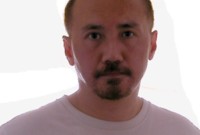What is the What by Dave Eggers
 What Is the What by Dave Eggers
What Is the What by Dave Eggers
One time, in my pre-teens, playing hide-and-seek I crawled under a bed. There, among the dust motes and other objects thrown under it, I found a book. It had illustrations, and not the kind little boys should be exposed to. And I’m not talking about porn. There were some pictures of bodies piled up hide in Nazi concentration camps. This little boy read the book's text, all about the Holocaust. Somehow, nobody found me, or they just forgot about it, and I was left there, to finish reading the book. After some time – hours, I think – I crawled out. When someone finally found me, I just burst out, crying.
Dave Eggers’s What is What almost has the same effect on me, now grown up. No I didn’t cry, but I did choke with emotion, reading about little Dinka boys being snatched by lions and carried away to be eaten, boys being slashed with knifes by marauding Arabs, others beheaded, babies thrown into wells, people burnt alive in their homes, shot when they run away.
These are what Achak, or Valentino or Dominic, a few names this character uses throughout his tale of running away from genocide in Sudan, witnessed, before he was flown to Atlanta, the US, to start a whole new life.
At the start of the book, Achak innocently opens the door to his apartment, to a black woman wanting to use his phone. A man with her assaults him, and then they proceed to rob him of his few material belongings. While he’s tied down, Achak tells his story of his life in Sudan, to his black American robbers. Actually, he’s telling this to you the reader, not really to them, even though he’s addressing them by name. He does this throughout the book, addressing Julian the hospital menial, for example.
Achak is one of the lucky Lost Boys who are selected to live in the US. However, life there is not all rosy. Yes, he gets lots of charity from Americans, who decide to help when they hear his story. But not all are like that, like those who rob him blind. And there is the notorious American health system. People like Achak do not have or can afford health insurance. When his room mate brings him to a hospital to treat his wounds, he has to wait several hours, even when he offers to pay for treatment himself.
Eggers’s book is fiction, but it is based on the experiences of a real-life Lost Boy, Valentino Achak Deng. Unlike westerners writing from the point of view of an African, like the South African who wrote Cry the Beloved Country, Eggers does not use local patios, phrasings or slangs. The language throughout is out-and-out American, grammatically constructed. Far from detracting from the authenticity of Achak’s actual African, or Dinka, voice, it manages to convey his story with stark details of the horrors of the war, and of his walking all the way from Sudan to Ethiopia, on foot. We read about how boys like him had to hide from planes dropping bombs, helicopters shooting at them, government soldiers determined to kill them, and from wild animals who want to eat them.
View all my reviews >>





















